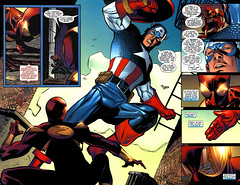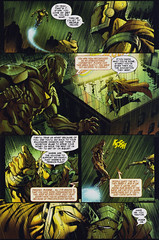Not a dream! Not a hoax! Not an imaginary story!
 Courtesy of the Internet, I’ve been reading Marvel’s recent comics “event” Civil War. Like all such comics crossovers, it’s largely an excuse to have superheroes get into fights with one another. What makes it actually rather enjoyable, though, is that the excuse in this case is a thinly-veiled version of the US government’s response to 9/11. There’s something fun about seeing superheroes beating each other up while attempting to debate the war on terror in old-school Marvel dialog. Mildly dumb though this is, it’s also extraordinarily charming in its ambition. For any form of popular entertainment these days to escape the solipsism of “postmodern” nostalgia is encouraging, and it’s particularly unexpected in superhero comics, a genre which appears to have been getting progressively more hermetically self-absorbed for the past 20 years.
Courtesy of the Internet, I’ve been reading Marvel’s recent comics “event” Civil War. Like all such comics crossovers, it’s largely an excuse to have superheroes get into fights with one another. What makes it actually rather enjoyable, though, is that the excuse in this case is a thinly-veiled version of the US government’s response to 9/11. There’s something fun about seeing superheroes beating each other up while attempting to debate the war on terror in old-school Marvel dialog. Mildly dumb though this is, it’s also extraordinarily charming in its ambition. For any form of popular entertainment these days to escape the solipsism of “postmodern” nostalgia is encouraging, and it’s particularly unexpected in superhero comics, a genre which appears to have been getting progressively more hermetically self-absorbed for the past 20 years.
Holy shit. I’ve just read Civil War: Frontline #4 , which features pictures from the current storyline overlaid with text about the Vietnam War, and explicitly draws parallels between the superhero “resistance” in the story and the NLF. The hubris is inspiring.
 Some time back, k-punk quoted a critical take on recent comics in general, and Civil War in particular, which attacked them as stories “which do nothing more than mimic current events.” I think this misses the mark, though. While I agree with the implied criticism of the pointless, dreary reaction of postmodern “realism,” I don’t think, at least in the case of Marvel comics, that it makes sense to contrast this realism simpy with the fantastic or utopian. Marvel comics have always been about a certain relationship to realism, which is why Spider-man, a superhero who finds school and girls more difficult than supervillains, is the quintessential Marvel character. This is not, however, the simple assertion of the reality principle one finds in contemporary attempts show that heroes are “just like us,” that is, the deflationary realist view that There Is No Alternative. Quite the contrary, the introduction of the superhero’s “real life” into Marvel’s comics functions parodically to show the absurdity of such a deflation. The point is to escape from the more subtle assertion of the reality principle in the presentation of utopian possibilities as utopian. Inserting real life into the ludicrous world of the comic shows that it is precisely the real world that is ludicrous; that the impossible not only happens, but cannot help from happening.
Some time back, k-punk quoted a critical take on recent comics in general, and Civil War in particular, which attacked them as stories “which do nothing more than mimic current events.” I think this misses the mark, though. While I agree with the implied criticism of the pointless, dreary reaction of postmodern “realism,” I don’t think, at least in the case of Marvel comics, that it makes sense to contrast this realism simpy with the fantastic or utopian. Marvel comics have always been about a certain relationship to realism, which is why Spider-man, a superhero who finds school and girls more difficult than supervillains, is the quintessential Marvel character. This is not, however, the simple assertion of the reality principle one finds in contemporary attempts show that heroes are “just like us,” that is, the deflationary realist view that There Is No Alternative. Quite the contrary, the introduction of the superhero’s “real life” into Marvel’s comics functions parodically to show the absurdity of such a deflation. The point is to escape from the more subtle assertion of the reality principle in the presentation of utopian possibilities as utopian. Inserting real life into the ludicrous world of the comic shows that it is precisely the real world that is ludicrous; that the impossible not only happens, but cannot help from happening.